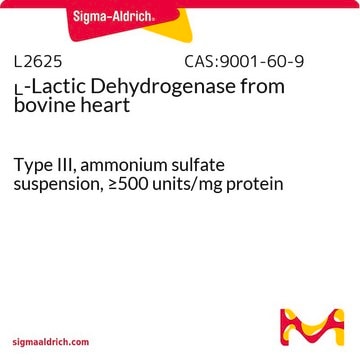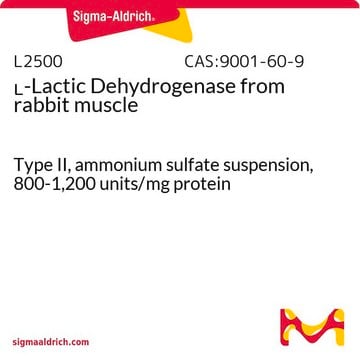L2011
D-Lactic Dehydrogenase from Lactobacillus leichmannii
ammonium sulfate suspension, ≥250 units/mg protein (biuret)
Synonym(s):
Lactate, (R)-Lactate:NAD+ oxidoreductase, D−LDH
Sign Into View Organizational & Contract Pricing
All Photos(1)
About This Item
CAS Number:
MDL number:
UNSPSC Code:
12352204
NACRES:
NA.54
Recommended Products
form
ammonium sulfate suspension
Quality Level
specific activity
≥250 units/mg protein (biuret)
foreign activity
Malic dehydrogenase <0.5% of base activity
storage temp.
2-8°C
General description
Research area: Cell Signalling D-lactate dehydrogenase belongs to the D-isomer-specific 2-hydroxyacid dehydrogenase family. Lactate dehydrogenase (LD) is a tetramer consisting of two (H and M) subunits. It has five isozymes (LD1 to LD5) and this composition varies in different tissues. LD1 is abundant in the kidney, heart, and erythrocytes. LD5 is found in the liver and skeletal muscles. LD is a ubiquitous molecule found in plants, yeast, mammals, and microorganisms and is a member of the oxidoreductase family.
Biochem/physiol Actions
Lactic dehydrogenase (LDH)plays an important role in the glycolytic pathway where it converts pyruvate tolactate by using NAD+ as a co-factor. It is considered animportant molecule that can be used in cancer therapy as it acts as aglycolytic inhibitor. Inhibition of LDH is associated with blocking of aerobicglycolysis in tumour cells.
Unit Definition
One unit will reduce 1.0 μmole of pyruvate to D-lactate per min at pH 7.0 at 25 °C.
Physical form
Suspension in 3.2 M (NH4)2SO4, pH 6.0
Storage Class Code
12 - Non Combustible Liquids
WGK
WGK 1
Flash Point(F)
Not applicable
Flash Point(C)
Not applicable
Personal Protective Equipment
dust mask type N95 (US), Eyeshields, Gloves
Certificates of Analysis (COA)
Search for Certificates of Analysis (COA) by entering the products Lot/Batch Number. Lot and Batch Numbers can be found on a product’s label following the words ‘Lot’ or ‘Batch’.
Already Own This Product?
Find documentation for the products that you have recently purchased in the Document Library.
Torben Larsen
Analytical biochemistry, 539, 152-157 (2017-11-06)
D-lactic acid in the mammalian body is mainly of microbiological origin and is often located somewhere along the digestive tract. Surgical, extensive re-sectioning of the small bowel may be one of the risk factors for altered balance in the microbiological
H Taguchi et al.
The Journal of biological chemistry, 266(19), 12588-12594 (1991-07-05)
The gene encoding D-lactate dehydrogenase (D-lactate: NAD+ oxidoreductase, EC 1.1.1.28) of Lactobacillus plantarum has been sequenced, and expressed in Escherichia coli cells with an inducible expression plasmid, in which the 5'-noncoding region of the gene was replaced with the tac
D L Zhang et al.
Postgraduate medical journal, 79(928), 110-112 (2003-03-04)
A 12 year old boy presented with 11 episodes of weakness, ataxia, nausea, slurred speech, dehydration, and sometimes severe lethargy bordering on coma. A year previously the boy had small intestinal resections leaving 20 cm of small bowel remaining. D-lactic
Monica Gallo et al.
Frontiers in bioscience (Landmark edition), 20(8), 1234-1249 (2015-05-12)
Despite the intense scientific efforts made, there are still many tumors that are difficult to treat and the percentage of patient survival in the long-term is still too low. Thus, new approaches to the treatment of cancer are needed. Cancer
C L McLaughlin et al.
Journal of dairy science, 92(6), 2758-2766 (2009-05-19)
A challenge model was used to evaluate a new approach to controlling acute acidosis. Acute acidosis reduces performance in both dairy and beef cattle and most often occurs as a consequence of ingestion of large amounts of readily fermentable starch
Articles
Instructions for working with enzymes supplied as ammonium sulfate suspensions
Our team of scientists has experience in all areas of research including Life Science, Material Science, Chemical Synthesis, Chromatography, Analytical and many others.
Contact Technical Service







